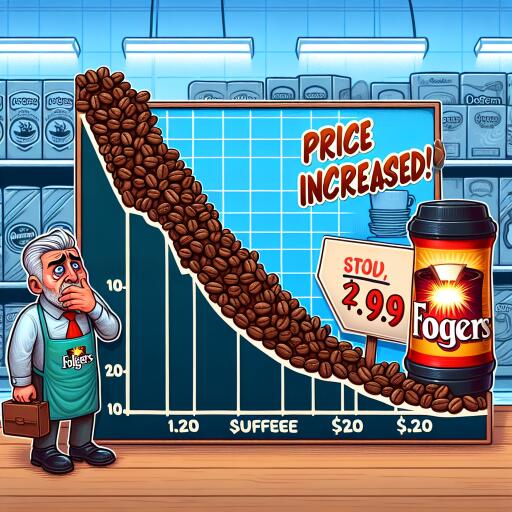Soaring Coffee Prices Force Folgers’ Owner To Increase Supermarket Prices
The journey of a coffee bean from the plant to your cup is fraught with complexities, market dynamics, and now, significant price hikes. This year, the coffee market has been particularly turbulent, with arabica and robusta coffee bean prices seeing substantial increases. Supply shortages from some of the world’s leading bean producers have compounded these price surges, setting off a chain reaction that is now impacting major US food brands.
In the world of coffee trading, arabica futures in New York have experienced a notable rise. However, it’s the robusta prices on the ICE exchange that have witnessed the steepest increase. This sharp uptick in coffee bean prices is more than just market fluctuations; it signifies a deeper issue affecting the entire supply chain, from farmers to consumers.
Anxiety amongst major food companies about these price hikes has been mounting, and it’s now clear that the sector cannot absorb these increases without repercussions. J.M. Smucker Co., a leading name in the food industry known for popular brands like Folgers, Dunkin’, Café Bustelo, Pilon, and Medaglia d’Oro, has publicly acknowledged the pressure. In a statement released in their earnings report, the company’s management laid out their strategy in response to the escalating costs of green coffee. They pointed to “commodity volatility and overall meaningful inflation” as significant challenges facing their coffee business.
According to the company, “In response to recent higher green coffee costs that we will begin to incur during the first quarter, we are taking a list price increase across parts of our portfolio in early June.” Stressing their approach, they aim to strike a balance between offsetting inflationary input costs and continuing to offer consumers a range of options, from value to premium products. This decision underlines a stark reality; higher coffee prices are on the horizon for consumers, potentially escalating food inflation further.
The narrative around food inflation has been contentious, with some attributing it to corporate ‘greedflation’. Despite these debates, the underlying factors driving coffee prices are complex and multifaceted, involving issues like climate change, supply chain disruptions, and increasing demand. Bereft of a significant economic downturn, it appears that elevated food prices, especially for essentials like coffee, may be here to stay for the foreseeable future. This “new normal” of high coffee prices presents challenges for consumers and companies alike, requiring both to adapt in a continuously evolving market landscape.
As supermarkets begin to adjust their pricing in response to these cost pressures, consumers will undoubtedly feel the impact at the checkout. With companies like J.M. Smucker Co. leading the way in announcing price adjustments, other food and beverage companies may soon follow suit. It underscores the pivotal role commodity prices play in the global food economy, transcending simple market dynamics and affecting daily living costs for millions of people. In this context, understanding the intricacies of the coffee market becomes not just a matter of business for companies, but a crucial aspect of everyday financial planning for consumers.
In conclusion, while coffee lovers may need to brace for higher prices, the current situation also presents an opportunity for increased awareness about the global coffee industry’s challenges. It encourages discussions about sustainability, equity in the supply chain, and the need for resilient agricultural practices to mitigate future shocks. For now, the rising coffee prices serve as a bitter reminder of the delicate balance between nature, markets, and our morning brew.
